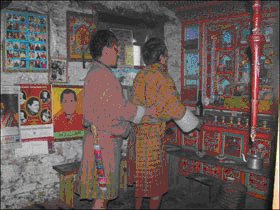
|
It was the eighth day of the 11th month of the dog year. Sangay Wangdi, a farmer of Karshong village in Trongsa, was out playing archery when he started acting strange all of a sudden.
“We took him home and he disappeared the next day,” said his daughter Kezang Dema, 22. When villagers went to look for him, they saw Sangay Wangdi on a rocky cliff, believed to the village deity’s residence. “From there he jumped on to a tree and stood on a branch,” said his brother-in-law, Sangay.
On the 10th day of the 12th month, he disappeared again, while his family was performing a ritual for his well being. He returned that afternoon with stones that looked like a gau (amulet) wrapped in a khadar (scarf).
Since then villagers of Karshong refer to the father of four children as lha, meaning someone who gets possessed by local deities or a pow, a medium through which nyeps (local spirits that reside in lakes and mountains) convey messages while in a state of trance. The 48-year-old farmer has surprised everyone in the locality by climbing steep cliffs and trees and speaking in Boekha (Tibetan).
On April 20, Kuensel observed Sangay Wangdi being possessed by their village deity, Ap Gongnyap. On that day, Sangay Wangdi got up at five in the morning, wore a mathra gho and offered water and butter lamps at the altar.
Not speaking much and looking lost, he sat near the bukhari (wood fed heater), drinking hot water and then suddenly convulsed as if in an epileptic fit then sighed deeply. Placing his left hand in front of the mouth and spreading his right hand in a flying position, he stood up and ran into the choesham (altar room), mumbling a lot in Boekha. His sister and wife requested the lha not to get angry and convey his message.
A 49-year-old neighbour, Tashi, who understands Tibetan, assists Sangay to interpret messages. The lha asked the family to pay attention to the huge rock below their two-storied house, as it was a lucky stone. Taking a white khadar from his choesham, Sangay handed it over to his nephew to place on the rock below the house. All of a sudden the lha got furious and conveyed that Sangay should stay clean and not defile himself. The family whispers that the possession is over. Sangay stands still for about five minutes, shivering. Tashi helps him to the living room where he sits down to rest.
Sangay admitted that he gets sick whenever he gets defiled. He carried a dead ox once and, when he got possessed, Sangay Wangdi was warned that if he does not stay clean, he would be thrown off a cliff or drowned in the river.
Sangay Wangdi has been taken to receive blessings from lams. His family wanted the lams to determine what was wrong with him. But none said which deity possessed him. Local residents believe that the village deity possesses him.
Sangay suffers from a hearing disorder and rarely goes out of his village, which consists of about 20 households in the lush green mountains and deep valleys of Trongsa. He has been to Thimphu twice.
Nubi gup Tashi Penden said that Sangay was a simple farmer who does not know anything. “We must take care of him,” he said. Sangay and his family are worried. While the family is concerned about Sangay’s health, he is worried that he cannot work. “I’ve to help my wife and daughter,” he said.
Bridges between worlds
According to a monk of the Trongsa dratshang, there are several kinds of intermediaries between the natural and spiritual world.
Terdas or chochongs need people to do rituals for them to get into a trance in public, but pows can get into a state of possession without any rituals. Terdas need people to help them translate their speech, depending upon which spirit gets into them.
In some societies, the powers of lhas and terdas are considered inherited, whereas in others they are considered to have been “called” and require lengthy training. Some start as an apprentice of an established lha, learn the customs, the taboos of that particular deity (each is different) and how to prepare their body to receive the deity in a state of trance.
The word pow means someone who is in a trance. A pow is a recognized person of a local deity who will possess that person as a medium through whom messages are conveyed.
Pows perform worldly rituals to village deities to clear obstacles, bring wealth and heal the sick. Pows may speak to their families and friends about personal or social problems, predicting the future or clarifying mysteries.
People often visit them for many reasons but most often it is to ensure that the spirits aid their work or to curse someone, who they feel is an enemy of theirs or opposes them.
|

